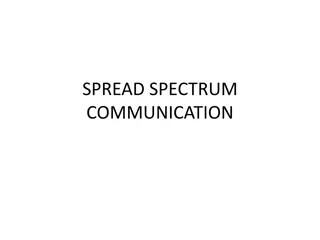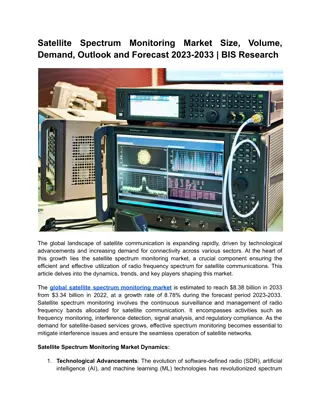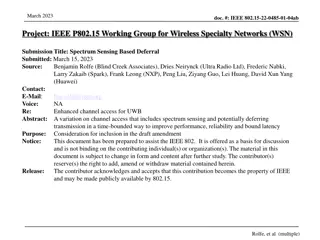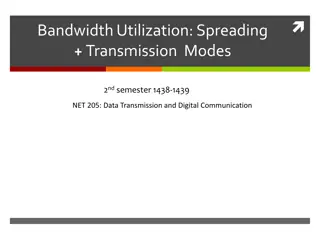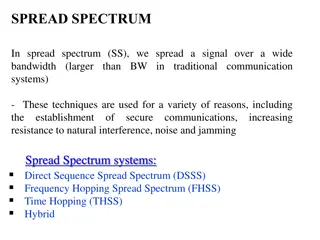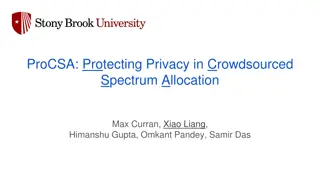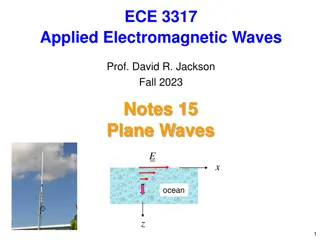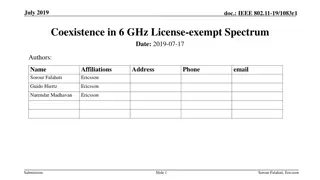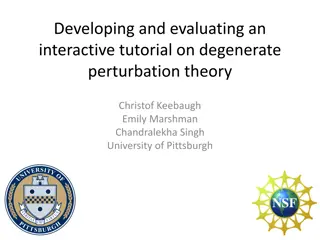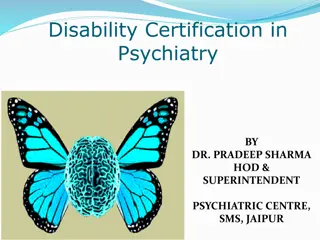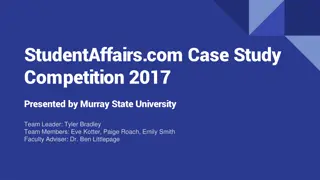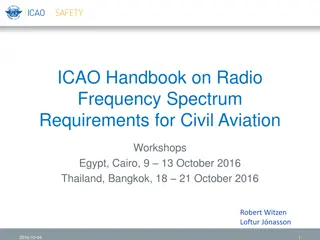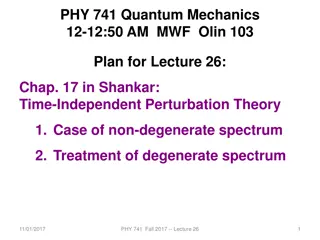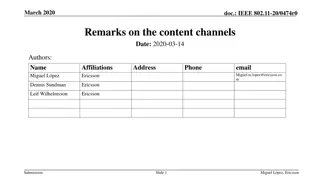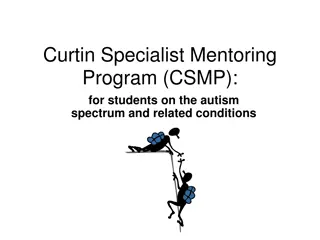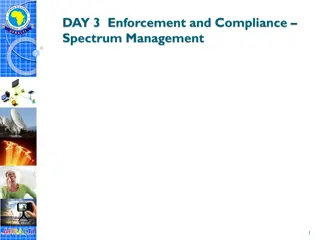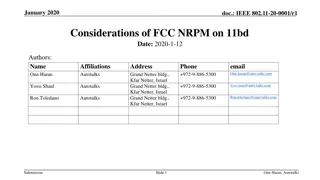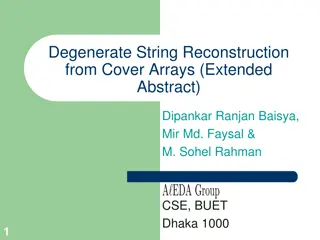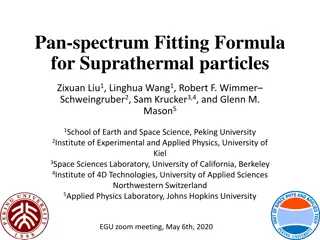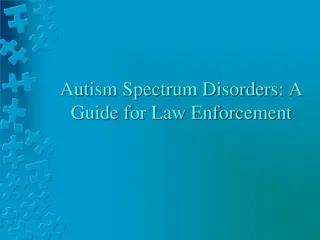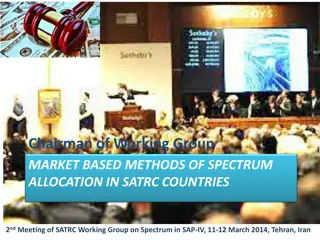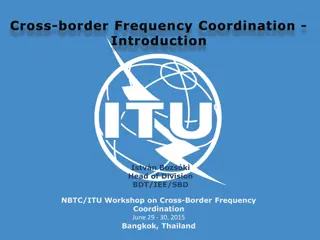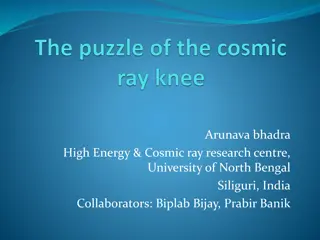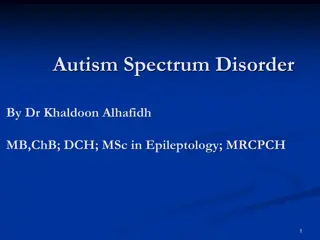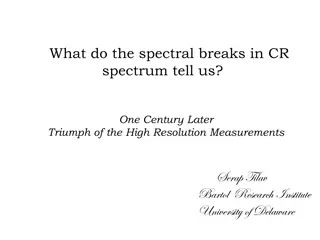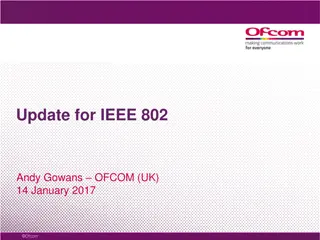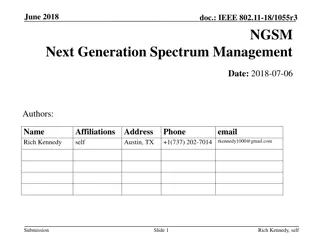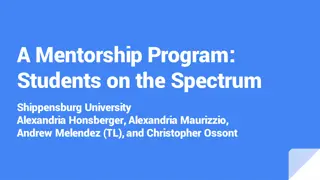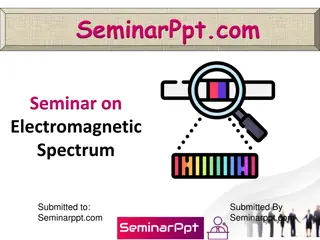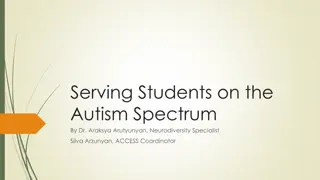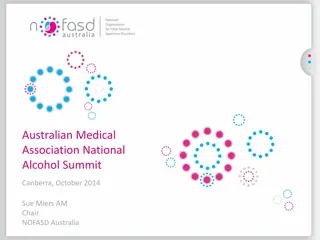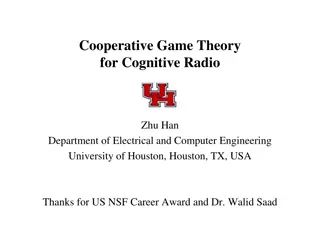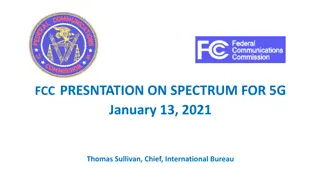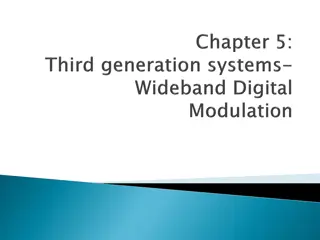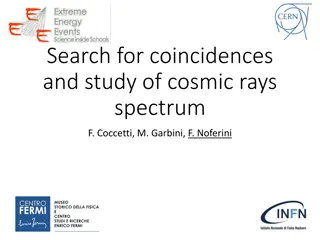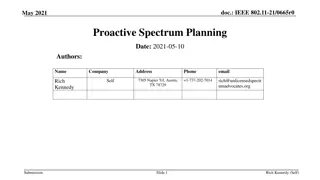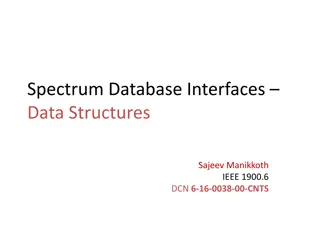Understanding Spread Spectrum Communication
Spread spectrum communication is a favored technology in military and commercial applications due to its resistance to jamming and interception. By spreading signals over a wide range of frequencies, it enhances security through encryption and authentication, making it challenging for attackers to d
4 views • 17 slides
Satellite Spectrum Monitoring Market Outlook and Forecast 2023-2033
The global satellite spectrum monitoring market is estimated to reach $5.14 billion in 2031 from $2.55 billion in 2021, at a growth rate of 7.24% during the forecast period.\nRead Report Overview: \/\/bisresearch.com\/industry-report\/satellite-spectrum-monitoring-market.html
1 views • 3 slides
Spectrum Sensing for Enhanced Channel Access in Wireless Networks
This document presents a proposal for Spectrum Sensing Based Deferral (SSBD) to improve channel access in wireless networks. SSBD incorporates spectrum sensing with transmission deferral in a time-bound manner to enhance performance, reliability, and latency control. The proposed solution safeguards
1 views • 11 slides
Understanding Spread Spectrum Techniques in Data Transmission
Explore the concepts of bandwidth utilization, spreading, and transmission modes in data transmission and digital communication. Learn about spread spectrum techniques such as frequency hopping and direct sequence spread spectrum, which enable efficient sharing of wireless communication channels. Di
1 views • 28 slides
Understanding Spread Spectrum Communication Systems
Spread spectrum techniques involve spreading a signal over a wide bandwidth for various reasons, such as secure communication, resistance to interference, noise, and jamming. This summary introduces Direct Sequence Spread Spectrum (DSSS), Frequency Hopping Spread Spectrum (FHSS), Time Hopping, and h
0 views • 25 slides
Enhancing Privacy in Crowdsourced Spectrum Allocation
This research focuses on protecting privacy in crowdsourced spectrum allocation, addressing the security challenges faced due to the presence of multiple entities and the sensitive information collected. By proposing potential ideas like Fully Homomorphic Encryption (FHE) and Secure Multi-Party Comp
0 views • 26 slides
Understanding Electromagnetic Waves: A Comprehensive Overview
Introduction to plane waves, the electromagnetic spectrum, TV and radio spectrum, and a comparison of wired and wireless systems. Discusses the properties and applications of various frequency ranges within the electromagnetic spectrum. Highlights the efficiency of wireless systems over wired system
0 views • 37 slides
Coexistence in 6 GHz License-Exempt Spectrum - IEEE 802.11-19/1083r1
This document discusses the principles and key features of unlicensed spectrum in the 6 GHz frequency band, focusing on coexistence with incumbent services, spectrum efficiency, and regulatory discussions. It also delves into channel access design for 3GPP technologies in the 5 GHz band, highlightin
0 views • 12 slides
Interactive Tutorial on Degenerate Perturbation Theory: QuILT Development and Student Difficulties
Developing an interactive tutorial on Degenerate Perturbation Theory (DPT) to aid students in understanding the challenging synthesis of Quantum Mechanics concepts with Linear Algebra. The tutorial focuses on addressing common student difficulties, such as identifying good bases, diagonalizing matri
0 views • 12 slides
Understanding Autism Spectrum Disorder: Overview and Assessment
Autism Spectrum Disorder (ASD) is a lifelong neurodevelopmental condition that affects social interaction, communication, and behavior. The spectrum includes a range of characteristics, from highly verbal individuals to non-verbal ones. Various disorders fall under the ASD umbrella, with different l
0 views • 14 slides
Supporting Students with Autism Spectrum Disorders: A Case Study
This case study highlights the challenges faced by students with Autism Spectrum Disorders (ASD) in academic, social, and daily living aspects. It discusses the transitional challenges, mission of the Autism Inclusion Program, and statistics related to students with ASD. The study sheds light on the
0 views • 22 slides
Understanding White Spaces Databases: An Empirical Study
White spaces in the TV band offer opportunities for unlicensed usage, motivating research on white space detection methods like geolocation spectrum databases and spectrum sensing. This study explores errors in white spaces databases, discussing the challenges and implications for white space device
2 views • 30 slides
College Support Program for Students on the Autism Spectrum - University of Louisville Case Study
Personal Growth, Social Integration, and Academic Assistance are the core goals of the College Support Program for Students on the Autism Spectrum at the University of Louisville. The program aims to assist students in self-discovery, advocacy, and skill development to thrive in their academic journ
0 views • 20 slides
ICAO Handbook on Radio Frequency Spectrum Requirements for Civil Aviation Workshops
This handbook provides insights into spectrum requirements for civil aviation workshops conducted in Egypt and Thailand in October 2016. It covers spectrum strategy, frequency management, spectrum overview for aviation, and frequency assignment planning to support the application of SARPs in Annex 1
0 views • 10 slides
Understanding Degenerate Perturbation Theory in Quantum Mechanics
Exploring time-independent perturbation theory, specifically focusing on non-degenerate and degenerate spectra. The lecture covers approximation schemes, treatment of multi-electron atom term values, and the effects of spin-orbit interaction. Concepts include evaluating expectation values, wavefunct
0 views • 13 slides
Enhancing Spectrum Efficiency with Low Complexity Erasure Codes in IEEE 802.11 Document
This document delves into the implementation of erasure codes for content channels in IEEE 802.11 systems. By utilizing erasure codes, spectrum efficiency can be boosted without significantly increasing the complexity of encoding and decoding processes. The discussion also covers the duplication of
0 views • 20 slides
Curtin Specialist Mentoring Program (CSMP) for Autism Spectrum Students
The Curtin Specialist Mentoring Program (CSMP) is designed to support tertiary students on the autism spectrum and related conditions by providing specialist mentoring and necessary accommodations. The program addresses the increasing rates of autism spectrum disorder diagnoses in Australia and the
0 views • 18 slides
Introduction to Spectrum Management and Regulations
Spectrum management involves administrative and technical procedures to ensure efficient radio-frequency spectrum utilization without interference. It includes allocation, allotment, and assignment of frequencies for various radiocommunication services. Specific terms related to frequency management
0 views • 61 slides
Proposal for Ensuring Spectrum Availability for V2X and WiFi Coexistence
The document discusses the implications of FCC's plan to allocate lower spectrum for WiFi and its potential impact on V2X services in the automotive industry. A proposal is outlined to add a sharing mode in case of spectrum limitations, aiming to safeguard V2X operations while facilitating WiFi adva
0 views • 9 slides
Efficient Algorithms for Degenerate String Reconstruction from Cover Arrays
Presented in this extended abstract are efficient algorithms for reconstructing a degenerate string from a valid cover array. The paper discusses the extensive use of degenerate strings in molecular biology for modeling biological sequences and expressing polymorphism. It introduces two algorithms�
0 views • 59 slides
Unified Pan-Spectrum Fitting Formula for Suprathermal Particles
Unifying spectrum formulas for suprathermal particles, the proposed pan-spectrum formula provides a versatile fitting method encompassing classic double-power-law, band function, and kappa distribution. Motivated by the need for more accurate spectrum information, the formula introduces five paramet
0 views • 14 slides
Understanding Autism Spectrum Disorders in Law Enforcement
This guide sheds light on Autism Spectrum Disorders (ASD) for law enforcement personnel, emphasizing the importance of recognizing and supporting individuals with ASD. It covers the characteristics of ASD, its prevalence, challenges in socialization and communication, and the spectrum of abilities w
0 views • 25 slides
Understanding Semiconductor Conductivity and Scattering Mechanisms
In the study of semiconductor conductivity, the concept of degenerate and non-degenerate semiconductors is discussed, showcasing the impact of doping levels. The conductivity equation is explored in terms of electron and hole mobilities and densities. The role of scattering mechanisms, such as latti
0 views • 18 slides
Market-Based Spectrum Allocation Strategies in SATRC Countries
Explore the implementation of market-based methods for spectrum allocation in SATRC countries. Learn about the requirements, benefits, and challenges associated with adopting market-based mechanisms, especially in the context of increasing demand for spectrum and technological advancements. Discover
0 views • 41 slides
Importance of Cross-Border Frequency Coordination in Spectrum Management
Effective coordination in spectrum management is crucial due to factors like geographical differences, population density, and economic activities, influencing the need for dialogue with neighboring countries to avoid interference. Cross-border agreements ensure efficient spectrum utilization, strat
0 views • 21 slides
Understanding Cosmic Ray Research: The Mysterious Knee in the Energy Spectrum
The energy spectrum of cosmic rays displays a unique power law behavior with distinct features such as the knee and the ankle. The knee, observed at around 3 PeV, marks a change in the spectral index. Various theories have been proposed to explain the origin of the knee, with suggestions ranging fro
0 views • 70 slides
Understanding Autism Spectrum Disorder: Overview, Characteristics, and Treatment
Autism Spectrum Disorder, a complex neurodevelopmental condition, presents challenges in social interaction, communication, and behavior. Individuals with autism may exhibit impaired social interactions, speech and language disorders, repetitive behaviors, and co-morbid conditions like learning diff
0 views • 25 slides
Insights into Cosmic Ray Spectrum Breaks and Hardening after Centuries of High-Resolution Measurements
Spectral breaks in cosmic ray (CR) spectrum reveal rigidity-dependent behaviors, such as proton break at 240 GeV and remarkable hardening post-breaks. Various experiments like PAMELA, ATIC, CREAM II, and others showcase unique features and spectral indices, shedding light on CR composition and accel
0 views • 15 slides
Update for IEEE 802 by Andy Gowans OFCOM (UK) January 2017
Update on various issues related to IEEE 802 including release of 5.8 GHz in the UK, WRC-19 agenda items, spectrum requirements, consultation responses, and license-exempt spectrum in the UK. Discusses drivers for future demand, DFS, and potential global Wi-Fi band release. Details on bands, user re
0 views • 14 slides
Next Generation Spectrum Management Initiative Overview
Rich Kennedy presented on the need to change spectrum management practices within IEEE 802, addressing the results of straw polls conducted and proposing further investigation into Multi-band White Space feasibility. The presentation also highlighted the interest in advocating for an AI-managed spec
0 views • 14 slides
Understanding Autism Spectrum Disorder: A Mentorship Program at Shippensburg University
Autism Spectrum Disorder, with its unique challenges and strengths, is a complex condition that affects social skills, communication, and behavior. This mentorship program at Shippensburg University aims to support students on the spectrum through person-first language and the social model of disabi
0 views • 25 slides
Understanding the Electromagnetic Spectrum: A Comprehensive Overview
The electromagnetic spectrum encompasses a vast range of frequencies and wavelengths of electromagnetic radiation. This seminar presentation delves into the definition, uses, significance, and formulas associated with the electromagnetic spectrum. Covering topics from radio waves to cosmic rays, it
0 views • 20 slides
Understanding Autism Spectrum Disorder and Supporting Students
Autism Spectrum Disorder (ASD) is a neurodevelopmental disorder with persistent impairments in social communication and restricted, repetitive behaviors. This presentation covers diagnostic criteria, classroom behaviors, response strategies, academic accommodations, national statistics, causes of in
0 views • 26 slides
Understanding Fetal Alcohol Spectrum Disorder (FASD) and Supporting Families
Fetal Alcohol Spectrum Disorder (FASD) poses significant challenges for individuals and families, requiring unique parenting approaches and lifelong support. The National Organisation for Fetal Alcohol Spectrum Disorders (NOFASD) in Australia provides crucial information, support services, and advoc
0 views • 18 slides
Cognitive Radio Network and Game Theory Exploration at University of Houston
Explore the application of cooperative game theory in cognitive radio networks, focusing on spectrum sensing, dynamic spectrum access, and coalitional games. Detailed overview of research conducted at the Department of Electrical and Computer Engineering, University of Houston. Learn about cognitive
0 views • 42 slides
The Future of 5G: FCC's Spectrum Plans and Innovations
The FCC's presentation highlighted the importance of spectrum for 5G development, emphasizing the key components of their 5G FAST Plan. The plan focuses on pushing more spectrum into the market, updating infrastructure policy, and modernizing regulations to drive innovation and investment in the U.S
0 views • 12 slides
Evolution of Communication Systems: From Bandwidth Division to Spread Spectrum
Third-generation communication systems utilize Pseudo-Noise (PN) codes to share bandwidth without interference, while first and second-generation systems divide bandwidth into smaller channels. PN codes are vectors with 1s and -1s, orthogonal to each other. Users transmit data using PN coding, combi
0 views • 14 slides
Insights into Cosmic Ray Spectrum and Coincidences Study
In-depth exploration of cosmic ray spectrum and coincidences study conducted by F. Coccetti, M. Garbini, F. Noferini, focusing on energy spectrum analysis of primary cosmic rays. The study involves simulations using Corsika, new tools like Coincidences DQM, and adjustments in parameter configuration
0 views • 9 slides
IEEE 802 Spectrum Planning: Proactive Approach for Improved Spectrum Management
Exploring the need for proactive spectrum planning in IEEE 802 to better manage the complex process of meeting spectrum needs efficiently and effectively. Delving into the challenges of spectrum allocation, sharing, and optimization to ensure that standards have the RF spectrum necessary for their r
0 views • 9 slides
Understanding Spectrum Databases and PAWS Parameters
Explore the world of Spectrum Databases and PAWS parameters, which provide essential information about available spectrum, permissible power levels, regulatory domains, geolocation data, and more. Learn about typical deployments, data types, and spectrum scheduling to enhance your understanding of s
0 views • 16 slides
